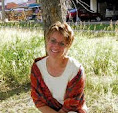Seasonal changes and the moon
We’re on the cusp of starting a new school year which for me
feels more like the ‘new year’ than the one we start on January 1st. A new school year also connects very strongly
with seasonal change; Fall is not far off.
We can often see the early signs that cooling temperatures and less
light bring to the natural world. Trees
and other plants change colour, drop leaves and flowers and slowly begin to die
back. Animals and birds start to
migrate, change colour or grow thicker coats.
It’s all about seasonal change.
Taan’s Moons: a Haida Moon Story by Alison Gear and
illustrated by Kiki van der Heiden with the Children of Haida Gwaii, beautifully
illustrates seasonal change in a specific area, the northwest coast of British Columbia.
This book looks to present traditional Haida Gwaii knowledge
that has been passed down through oral tradition and varies between villages,
clans, families and language groups about the Haida moon cycle.
Each double page spread features one of twelve different
moons spanning a year. Bear Moon, Snow Moon and Bears Hibernate Moon occur
during the winter months, for example. Each title is in English, Skidegate
Haida and Old Massett Haida. Every moon has a four line poem that speaks to the
essence of that time period as it relates to the life of a bear.
Bears Hibernate Moon is described as,
Taan lumbers up the
mountain;
hemlock curtains
close.
She crawls into a dent
or roots,
and then begins to
doze.
The illustrations have been co-created by Kiki van der
Heiden and primary grade children from various schools in the Haida Gwaii area,
using felt. The illustrator states, “the
images that bring this story to life have come from the children’s
imaginations, and have been enthusiastically and lovingly created by them, with
final touches respectfully applied by Kiki.”
Great care has been given to recognizing everyone involved
in this project, appreciation for the traditional stories and the Indigenous
people who tell them. The book includes a forward (by Richard Van Camp), a
preface, back notes honouring contributors, artists and other participants of
which there were many, a note about Haida language, a note about the
illustrations and credit for where “a
written record of this particular cycle can be found.”
This is a lovely book that works across content areas
embedding Indigenous knowledge and connecting to nature. What better way could there be to learn about
culture, science, nature, art, story, poetry and language?
I recommend this one for elementary grades.














0 comments:
Post a Comment